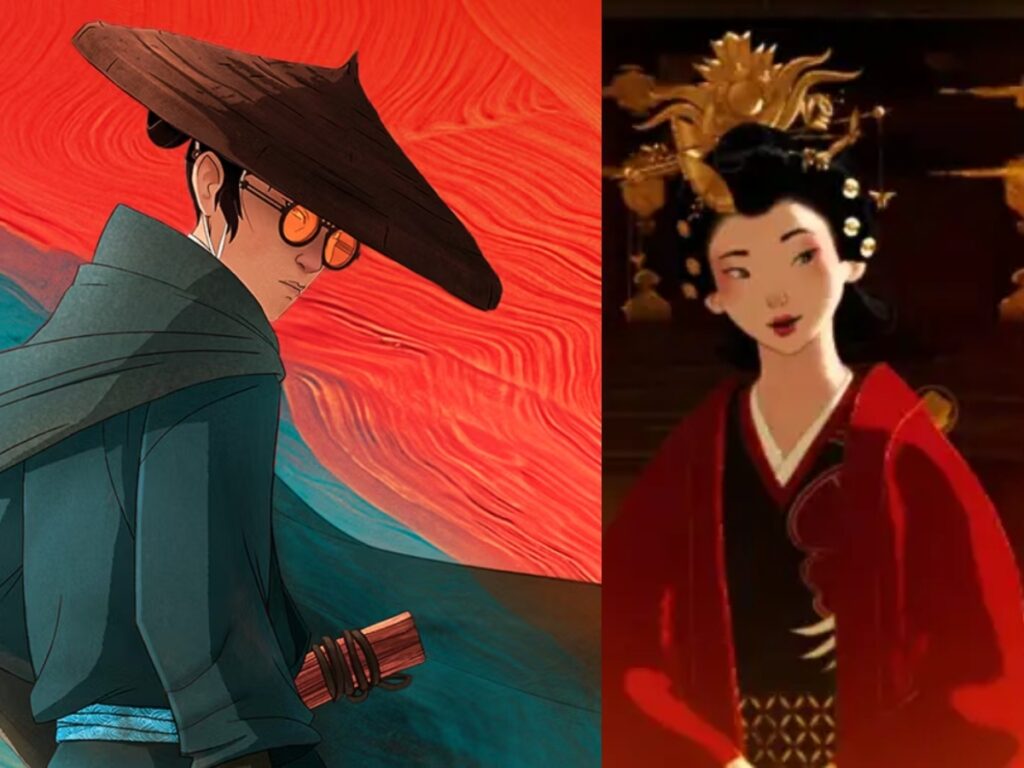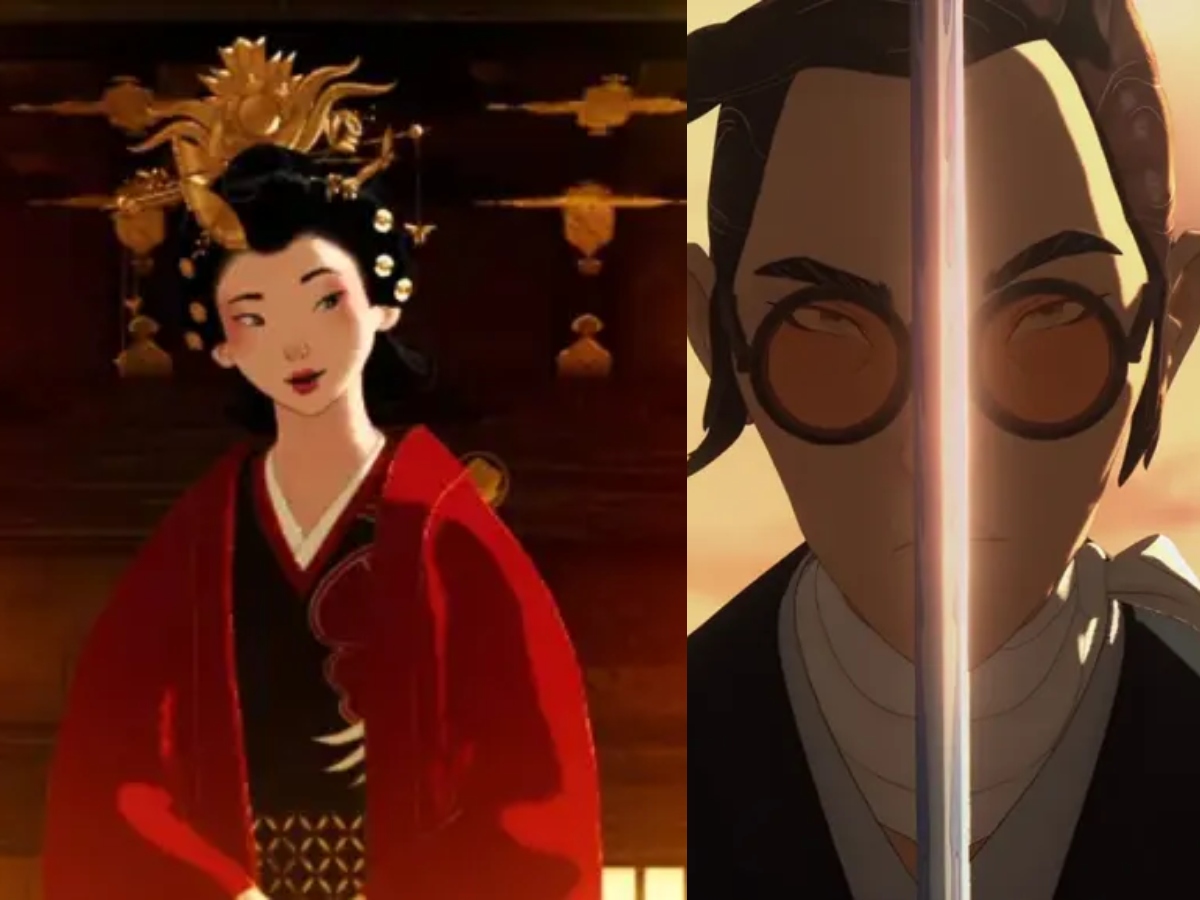The genesis of the new adult animated action streaming TV series, “Blue Eye Samurai,” which made its debut on Netflix on November 3, 2023, is a testament to the boundless wellspring of inspiration that surrounds us. The inception of this remarkable action-fiction show can be traced back to the creative minds of its co-creators, Noizumi and Michael Green, a talented husband and wife duo.
The catalyst for “Blue Eye Samurai” was a deeply personal and touching moment in their lives when they welcomed their daughter into the world. Noizumi, who possesses a half-Japanese heritage, was struck by the fact that her daughter had striking blue eyes. This seemingly simple observation set off a chain of thoughts that led to a profound realization. In the context of Japan’s history, particularly during the Edo period that began in the 17th century, having such distinct features would have been inconceivable, and in fact, quite problematic. The concept of having blue eyes, which was associated with a non-Japanese appearance, was met with legal restrictions and societal disdain.
However, the world has evolved, and perspectives have shifted dramatically. In the present day, the idea of having blue eyes is no longer considered a source of discord. As Noizumi and Michael Green discussed the intriguing contrast between their daughter’s appearance and the historical context, an evocative phrase emerged from their conversation: “She’s like a little blue-eyed samurai.” It was a brief but electrifying moment that kindled a creative spark in them.

Recognizing the potential of this concept, Michael Green promptly transcribed the phrase, knowing that it held the key to a captivating and thought-provoking story. Thus, “Blue Eye Samurai” was born, a title that encapsulates the essence of the series and the unique blend of cultural and historical themes that it explores. The show is a testament to the power of inspiration, drawing from personal experiences and historical narratives to craft a compelling narrative that captivates and engages its audience.
Green, a significant contributor to the show, expressed his intention for the audience to become fully engrossed in the narrative and appreciate the level of artistic craftsmanship to the extent that they momentarily overlook the fact that they are viewing animated content. His aim was to create an experience where viewers feel deeply immersed in the world of this action-fiction series, fostering a sense of being an integral part of the journey.
Blue Eye Samurai: A Riveting Tale of Revenge and Redemption
Blue Eye Samurai is a captivating animated series that seamlessly blends humor, heartbreak, darkness, and gore into a visually stunning narrative. This show is poised to join the ranks of timeless revenge stories. At its core, it follows the compelling journey of Mizu, a blue-eyed samurai of mixed heritage, whose unwavering determination drives her to seek vengeance against those accountable for her mother’s tragic demise.
The narrative unfolds with Mizu, a formidable solitary warrior, unexpectedly crossing paths with an unlikely travel companion. Together, they embark on a perilous journey, confronting a myriad of challenges along the way. Throughout her quest for retribution, Mizu forms unexpected alliances with individuals such as Ringo, Taigen, and Princess Akemi, each of whom becomes an integral part of her overarching mission. Blue Eye Samurai promises to deliver a thought-provoking and visually enthralling exploration of revenge and redemption, making it a must-watch series for enthusiasts of complex, character-driven storytelling.

In the 17th Century, Japan experienced a period of isolation from the outside world, resulting in a limited exposure to individuals of different ethnic backgrounds. While Japan’s borders remained mostly closed during this time, rare instances of foreign presence occurred, primarily through illegal trade. The individuals from these encounters and their offspring were often subjected to societal stigmatization, regarded as monstrous, impure, and inferior to those with purely Japanese ancestry in terms of their appearance, lineage, and ethnicity.
Mizu, who is aware of the mere existence of four white men in Japan during her birth, harbors a deeply rooted desire to exact revenge upon these individuals. Among these four men, one is believed to be her biological father, the very person responsible for her life filled with shame and despair.
Mizu’s aspirations, while not entirely unattainable, face significant obstacles due to her gender. As a female in a society where women are expected to remain inconspicuous and avoid involvement in acts of violence, Mizu is compelled to conceal both her true identity and her intent behind a clever disguise.
Her striking blue eyes, a distinctive mark of her perceived heritage, brand her as the offspring of a “white devil.” To achieve her objectives, Mizu must navigate a treacherous path filled with subterfuge and secrecy. The question remains: will she succeed in her quest for retribution?
The principal ensemble of “Blue Eye Samurai” boasts a notable lineup, featuring Maya Erskine in the role of Mizu, Brenda Song portraying Akemi, Darren Barnet as Taigen, and Masi Oka as Ringo. Should the series be granted a renewal, viewers can anticipate the return of these accomplished actors, along with the introduction of fresh talent to further enrich the show’s ensemble.
Blue Eye Samurai Season 2: Awaiting Official Confirmation
The inaugural season of Blue Eye Samurai has recently concluded, leaving both fans and critics intrigued about the prospects of a second season. As is often the case with Netflix originals, uncertainty looms, but the program’s resounding popularity may well sway the decision-makers.
Blue Eye Samurai has earned an impressive 9.1-star rating on IMDb and a flawless 100% rating on Rotten Tomatoes, a testament to its exceptional reception. As of the time of this report, it ranks fourth among the most sought-after animated series available for streaming.
Netflix Animation, Blue Spirit, and 3 Arts Entertainment are the production companies behind this captivating series, which spans eight episodes with runtimes ranging from thirty-five to sixty minutes.
As of now, there has been no official announcement regarding the show’s renewal. It’s worth noting that it has only been a matter of days since the first season concluded, and we remain cautiously optimistic. Given the unexpectedly high viewer ratings and the enthusiastic fan response, there is reason to hope for a sequel. However, until an official statement is released, the fate of Blue Eye Samurai’s return remains undisclosed.


[…] Also Read : Blue Eye Samurai season 2 […]